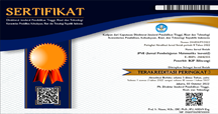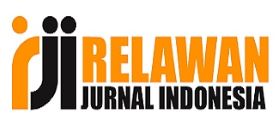INOVASI BAHAN AJAR ARITMATIKA SOSIAL BERLANDASKAN PROBLEM SOLVING PADA KELAS VII
DOI:
https://doi.org/10.22460/jpmi.v5i1.p%25pKeywords:
Social Arithmetic, Module, Problem SolvingAbstract
References
Anggita Denia, Vera Mandailina, & Syaharuddin Al Musthafa. (2018). Pengembangan LKS Matematika Menggunakan Pendekatan Problem Solving Pada Materi Aritmatika. Jurnal Pendidikan Berkarakter, 1(1), 214–219.
Aries Yuwono. (2016). Problem Solving dalam Pembelajaran Matematika. UNION: Jurnal Pendidikan Matematika, 4(1), 143–156.
Bayuningsih, A. S., Usodo, B., & Subanti, S. (2017). Analysis of Junior High School Students’ Problem-solving Ability Reviewed from Self-regulated Learning. International Journal of Science and Applied Science: Conference Series, 2(1), 51–59. https://doi.org/10.20961/ijsascs.v2i1.16678
Chandra Adi Prabowo, Ibrohim, & Murni Saptasari. (2016). PENGEMBANGAN MODUL PEMBELAJARAN INKUIRI BERBASIS LABORATORIUM VIRTUAL . Jurnal Pendidikan, 1(6), 1090–1097.
Feriyanti, Nindy. (2019). PENGEMBANGAN e-MODUL MATEMATIKA UNTUK SISWA SD. Jurnal Teknologi Pendidikan Dan Pembelajaran, 6(1), 1–12
Gede Gunantara, I Made Suarjana, & Putu Nanci Riastini. (2014). PENERAPAN MODEL PEMBELAJARAN PROBLEM BASED LEARNING UNTUK MENINGKATKAN KEMAMPUAN PEMECAHAN MASALAH MATEMATIKA SISWA KELAS V. Jurnal Mimbar PGSD Undiksha, 2(1), 1–10.
Husna, & Fona Fitry Burais. (2018). Penggunaan Problem Solving untuk Meningkatkan Kemampuan Pemecahan Masalah Matematis Siswa SMP. Jurnal Peluang, 6(2), 1–7.
Huswatun Hasanah. (2018). Pengembangan Bahan Ajar Cetak Berbasis Pendekatan Problen Solving Untuk Meningkatkan Literasi Matematis. Jurnal Matematika, 1(2), 137–148.
Khusnah, N., Sulasteri, S., Suharti, & Nur, F. (2020). Pengembangan media pembelajaran jimat menggunakan articulate storyline. Jurnal Analisa, 6(2), 197–208. https://doi.org/https://doi.org/10.15575/ja.v6i2.9603
Marzuki, M., & Khanifah, S. (2016). Pendidikan ideal perspektif Tagore dan Ki Hajar Dewantara dalam pembentukan karakter peserta didik. Jurnal Civics: Media Kajian Kewarganegaraan, 13(2), 172–181. https://doi.org/10.21831/civics.v13i2.12740
Muhammad Dicky Al Ghaffar, Hapizah, & Hiltrimartin, C. (2020). Pengembangan Bahan Ajar Aritmatika Sosial Kelas VII Berbasis Android untuk Pembelajaran Problem Solving.
Nengrum, T. A., Solong, N. P., & Iman, M. N. (2021). Kelebihan dan Kekurangan Pembelajaran Luring dan Daring dalam Pencapaian Kompetensi Dasar Kurikulum Bahasa Arab di Madrasah Ibtidaiyah 2 Kabupaten Gorontalo. Jurnal Pendidikan, 30(1), 1–12. https://doi.org/https://doi.org/10.32585/jp.v30i1.1190
Nurfitriani, S. dan M. (2017). Pengembangan Media Pembelajaran Interaktif Berbasis Komputer dalam Pembelajaran Matematika, Materi Bilangan pada Kelas 3 SD. Jurnal Formatif: Pendidikan MIPA, vol 7, No.
Pane, A., & Darwis Dasopang, M. (2017). BELAJAR DAN PEMBELAJARAN. FITRAH:Jurnal Kajian Ilmu-Ilmu Keislaman, 3(2), 334–252. https://doi.org/10.24952/fitrah.v3i2.945
Putrawangsa, S., & Hasanah, U. (2018). INTEGRASI TEKNOLOGI DIGITAL DALAM PEMBELAJARAN DI ERA INDUSTRI 4.0. Jurnal Tatsqif. https://doi.org/10.20414/jtq.v16i1.203
Setyosari, P. (2014). MENCIPTAKAN PEMBELAJARAN YANG EFEKTIF DAN BERKUALITAS. JINOTEP (Jurnal Inovasi Dan Teknologi Pembelajaran) Kajian Dan Riset Dalam Teknologi Pembelajaran, 1(1). https://doi.org/10.17977/um031v1i12014p020
Sri Astuti, Suwarno Ariswoyo, & Madyunus Salayan. (2020). PENGEMBANGAN BAHAN AJAR BERBASIS PROBLEM SOLVING UNTUK MENINGKATKAN KEMAMPUAN PEMECAHAN MASALAH MATEMATIKA. Jurnal MATEMATICS PAEDAGOGIC , 5(1), 98–113.
Suharti, Nur, F., & Alim, B. (2021). Polya Steps for Analyzing Errors in Mathematical Problem Solving. Al-Ishlah: Jurnal Pendidikan, 13(1), 741–748. https://doi.org/https://doi.org/10.35445/alishlah.v13i1.570
Suprih Widodo, & Kartikasari. (2017). PEMBELAJARAN PEMECAHAN MASALAH MATEMATIS SISWA SEKOLAH DASAR DENGAN MODEL CREATIVE PROBLEM SOLVING (CPS). Jurnal Prisma, 6(1), 57–65.
Susi Siswanti, Sulistyo Saputro, & Suryadi Budi Utomo. (2016). Pengembangan Modul Termokimia Berbasis Problem Solving Untuk Siswa SMA/MA Kelas XI Semester 1 Kurikulum 2013. Inkuiri: Jurnal Pendidikan IPA, 5(1), 28–36. https://jurnal.uns.ac.id/inkuiri/article/view/9500.
Downloads
Published
Issue
Section
License
Copyright (c) 2022 JPMI (Jurnal Pembelajaran Matematika Inovatif)

This work is licensed under a Creative Commons Attribution-ShareAlike 4.0 International License.
The author is responsible for acquiring the permission(s) to reproduce any copyrighted figures, tables, data, or text that are being used in the submitted paper. Authors should note that text quotations of more than 250 words from a published or copyrighted work will require grant of permission from the original publisher to reprint. The written permission letter(s) must be submitted together with the manuscript.
















